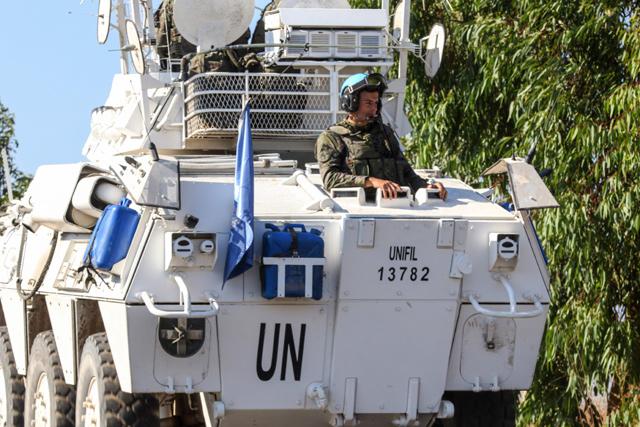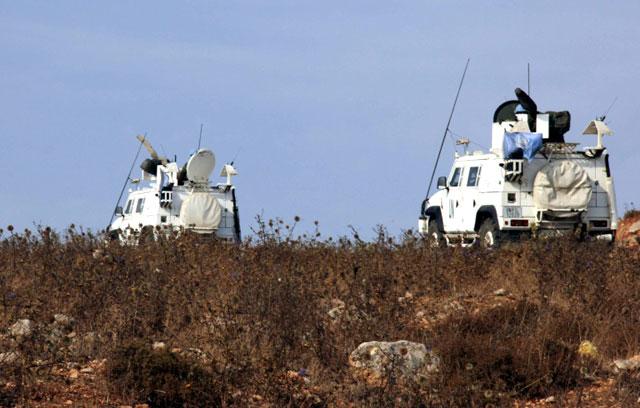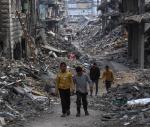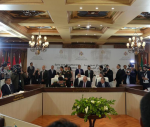You are here
Israel strikes Hizbollah after gunfire on Lebanon border
By AFP - Aug 27,2020 - Last updated at Aug 27,2020
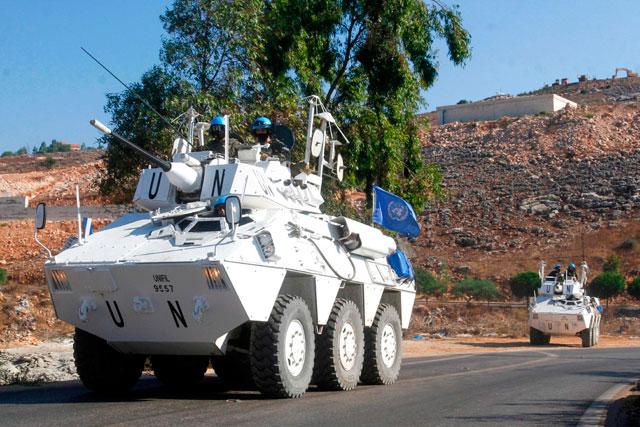
United Nations peacekeeping force patrol near the village of Mais Al Jabal, along the southern Lebanese border with Israel, on August 26 (AFP photo)
MANARA, Israel — Israel said on Wednesday it had launched air strikes against Hizbollah observation posts in Lebanon after shots were fired from across the border towards its troops the previous evening.
The border flare-up came hours after Lebanon rejected an Israeli call to reform the UN peacekeeping force which patrols the border ahead of a UN Security Council vote to renew its mandate.
The Israeli occupation forces had said earlier that a "security incident" was unfolding near Manara, a kibbutz near the UN-demarcated border between the two countries, and urged residents to take shelter.
Lebanon's state-run National News Agency (NNA) reported Israeli gunfire and flares around the village of Mays Al Jabal, just across the border from Manara.
An AFP video journalist on the Lebanese side of the border heard shelling on Tuesday evening and local residents reported flares falling around their homes.
In the village of Hula, Hussein Hijazi said that a flare fell just outside his house but did not ignite.
Lebanon's top security body, the Supreme Defence Council, decided to file a complaint to the UN Security Council over the Israeli fire into Lebanon, NNA reported.
Manara was quiet on Wednesday morning, an AFP journalist reported. The army told residents they could come into the open and resume work in the fields.
Israel and Lebanon are still technically at war, and the United Nations force, UNIFIL, is tasked with monitoring their ceasefire.
Lebanon had hours earlier rejected an Israeli call to reform UNIFIL ahead of a UN Security Council vote to renew its mandate.
The incident also comes after Hizbollah announced at the weekend it had brought down an Israeli drone flying over the border.
The Iran-backed militant group vowed in September last year to down Israeli drones flying over Lebanon, following an incident a month earlier when two drones packed with explosives targeted its stronghold in south Beirut.
Set up in 1978, UNIFIL was beefed up after a month-long war in 2006 between Israel and Hizbollah.
The 10,500-strong force, in coordination with the Lebanese army, is tasked with monitoring a ceasefire and Israeli pullout from a demilitarised zone on the border.
Israel accuses the force, whose latest mandate expires at the end of August, of not being active enough against Hizbollah.
It accuses the militants of stockpiling weapons at the border, and has been pushing for the UN force to be allowed to inspect private property.
But Lebanon’s caretaker Foreign Minister Charbel Wahbe informed the five veto-wielding permanent members of the Security Council on Tuesday that his government wanted the force to stay on “without modifying its mandate or its numbers”.
Hizbollah wields considerable political influence in Lebanon and its allies dominate the caretaker government.
Israel has claimed it carried out dozens of air strikes on Hizbollah and Iranian targets in neighbouring Syria in what it says is a campaign to prevent Tehran providing Hizbollah with the technology to replace its arsenal of rockets with ballistic missiles capable of penetrating Israel’s Iron Dome air defence shield.
Meanwhile, Israeli warplanes struck a Hamas target in Gaza overnight, the military said Wednesday, even as a Qatari envoy joined efforts to broker an end to the almost three-week flare-up.
Israel has bombed the enclave almost daily since August 6, in response to allegeed airborne incendiary devices and, less frequently, rockets across the border.
The fire bombs, crude devices fitted to balloons, inflated condoms or
The fire balloons are widely seen as an attempt by Hamas to improve the terms of an informal truce under which Israel committed to ease its 13-year-old blockade in return for calm on the border.
An Egyptian delegation has been shuttling between the two sides to try to broker a renewal of the truce, and on Tuesday evening Qatar’s Gaza envoy Mohammed Al Emadi entered the territory to join the mediation effort.
The latest agreed ceasefire, which has already been renewed several times, has been bolstered by millions of dollars in financial aid from the gas-rich Gulf state.
Sources close to the envoy said he was delivering a new tranche of 30 million dollars for disbursement to needy families in the impoverished enclave.
Sources close to Hamas say it also wants other measures to ease living conditions in the territory where unemployment exceeds 50 per cent.
They include the extension of an industrial zone in the east of Gaza, the construction of a new power line, and an increase in the number of Israeli work permits issued to Gazans once anti-coronavirus restrictions have been lifted.
On Monday, the Hamas authorities announced a 48-hour lockdown across the territory after four cases of the virus were confirmed in a Gaza Strip refugee camp.
Related Articles
UNITED NATIONS, United States — The UN on Friday renewed its peace mission in Lebanon for a year but reduced its troop capacity and requeste
BEIRUT — Lebanon's Iran-backed Hizbollah said Saturday it had downed and seized an Israeli drone that flew over the UN-demarcated Blue Line
BEIRUT — Lebanon’s Iran-backed Hizbollah group said it fired waves of rockets and drones at the Israeli forces on Thursday, after an Israeli


